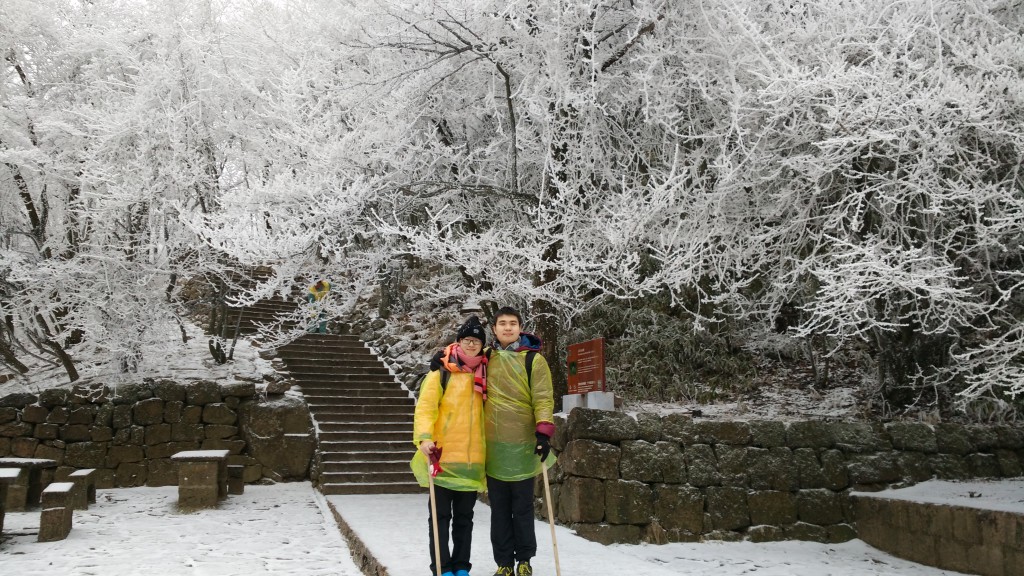Life
2015-01-30
January 30, 2015, was the deadline for SIGCOMM 2015 paper submissions, but I went to Huangshan for a trip.  IMG_20150130_083809
IMG_20150130_083809
Preparations Before Departure {/examples/}
It was our first time going to Huangshan. As early as December 15, when our final exam schedule was confirmed, we started preparing.
Time {/examples/}
We set off the day after my final exams ended. After checking some travel guides, we found that Huangshan is suitable for a two-day trip, with one night spent on the mountain. Including the round trip to Hefei, it would take a total of four days.
Transportation {/examples/}
There are two routes from Hefei to Huangshan:
- Take a train to Huangshan Railway Station (located in Tunxi, Huangshan City), then take a one-hour bus to Tangkou Town at the foot of Huangshan.
- Take a direct bus from Hefei Long-Distance Bus Station to Tangkou Town at the foot of Huangshan.
After arriving at Tangkou Town at the foot of Huangshan, to enter the Huangshan Scenic Area, you can only take the Xin Guoxian bus, which costs 19 yuan per person. The bus ride is a 20-minute winding mountain road, about 10 kilometers. The bus goes in two directions, one to Ciguang Pavilion at the front mountain and one to Yungu Temple at the back mountain. Both Ciguang Pavilion and Yungu Temple have cable cars to go up the mountain, or you can hike up (about 5 kilometers, taking 3 hours). Currently, the cable car at the front mountain is closed for maintenance, and hiking up is too tiring, so tourists usually go up from the back mountain, stay overnight on the mountain, and descend from the front mountain.
Since Jingning gets carsick and can’t sit on a bus for long periods, we chose the train-then-bus option. Currently, there are only K-series trains from Hefei to Huangshan, taking 6-7 hours (high-speed trains will be available this year). Although train tickets from Hefei to Huangshan are not in high demand during winter, we still booked our tickets a month in advance.
Buses within Huangshan City and the Huangshan Scenic Area run every half hour, and reservations are neither needed nor possible.
Accommodation {/examples/}
For the two nights at the foot of the mountain, you can choose to stay in Huangshan City or at the foot of the mountain. Accommodation on the mountain is relatively tight and needs to be booked in advance. You can do this on Ctrip.
Gear {/examples/}
- Documents: ID card, student ID
- Electronics: Mobile phone, iPad, power bank, flashlight (bought from Taobao, but didn’t use it)
- Warm clothing: Scarf, gloves, hat, seat cushion (Huangshan is very cold in winter)
- Climbing aids:
- Clothing: Each person brings 2 pairs of socks, underwear, towel for bathing
- Toiletries: Toothbrush, toothpaste, cup, lip balm, hand cream, skincare products…

January 28 {/examples/}
2014-12-18
One afternoon in May 2013, Room 5005 of the Physics and Chemistry Building. I was holding Senior He Yu’s phone, calling Lu Yuanwei, who was in a joint training program at MSRA. Maybe I was too nervous; after the call, both the screen and my hand were covered in sweat. A few days earlier, I received a notification: I was admitted to the MSRA joint training program. I replied that I was working on a startup project and might not have time to go. Microsoft urged me to make a decision quickly. I originally wanted to decline on my own, but I thought I should listen to Boss He’s opinion.
Background: The joint training program between USTC and MSRA opens for applications every April. After resume screening and interviews, about 18 people are admitted. They intern at MSRA for their senior year, and their thesis is also done at MSRA. Among these 18 spots, 14 are for those who will continue their studies domestically, and the remaining 4 are for those going abroad or seeking employment. After two months of internship, around early September, about 7 out of the 14 will be selected to stay for a Ph.D., while the rest return to school for their master’s. The so-called joint training Ph.D. means the first year is spent taking classes at USTC, and the next four years are spent doing research at MSRA, ultimately earning a degree from USTC (so we are genuine USTC graduate students, not trainees).

Both Lu Yuanwei and Senior He Yu said it was a good opportunity and suggested I consider it carefully. I thought I would intern for a summer first, see how it goes, and then decide.
At that time, I was deeply influenced by the culture of Linux and free software and had quite a few prejudices against Microsoft. When HR called to confirm my “start date,” I asked why it was called “start date.” Only then did I realize I was going as an intern for joint training, and it felt awkward to become an employee of a company I didn’t like at the time.
2014-11-28
Translator’s note: Jennifer Rexford is a professor at Princeton University and a leading figure in the field of network research. She gave a talk to new graduate students in the field of engineering in 2010: Advice for New Graduates.
Those who know me know that I have a hobby of collecting famous quotes. A sentence explains the story behind this: famous quotes are short and portable, which is a suitable hobby for me who often moved when I was a child. Two famous scientists from Princeton in the 1930s, Einstein and Thomas Lewis, made interesting and somewhat opposing comments on the role of the “individual”.
Einstein in the field of physics said: “All valuable things in human society depend on the opportunity for individual development.”
Thomas Lewis in the field of pharmacology and biology said, “In fact, there is no such thing as a single individual; his own life is not much more than a cell torn from the surface of the skin.”
These two quotes summarize well what graduate students do.
2014-11-19
On September 19, 2014, at 22:30, I was dragging a suitcase half my weight, walking alone under the mottled tree shadows in the west district of USTC. Just a few hours ago, I was studying the knapsack problem: how to bring back as many valuable things as possible under the constraint of backpack volume.
At that time, only a few people knew I was back: the boss and colleagues in the group, my parents, and Zhang Jingning. Just a few days ago, the LUG buddies were still discussing whether I would come back in October: because I messed up the mirrors server, I still owe everyone a meal!
This was the original beginning of the life summary written on October 20, “Escape from the Activity Room“. But I felt it was inappropriate, so I changed it to “Escape from Microsoft”. At the beginning of this month, I changed my Renren cover photo to the staff group photo of SFD on September 20, just to commemorate the beginning of this year’s new life.

2014-10-29
All active members of LUG will sooner or later be attracted to the circle of coders.
The origin and truth of this rumor are not considered for the time being. Whether it is the atmosphere of LUG that leads the buddies to the road of coders, or those who are determined to take the road of coders will be active in LUG for a long time, I can’t tell.
Why choose computer science major, in fact, is two propositions:
- Why choose computer as a future career?
- Why choose computer science major during undergraduate?
I try to interpret these two propositions with my own experience. In my youth, I once regarded scientist as my dream. In the third year of high school, I thought about doing theoretical computer research. At the juncture of freshman to sophomore, I once hesitated between mathematics and computer science, and even considered studying physics. Because I couldn’t figure it out, I didn’t apply for a change of major in the second semester of my freshman year. A week after the start of the second semester of sophomore year, I felt that I couldn’t continue to be chaotic, so I submitted an application for a change of major. From the second week, I embarked on the road of no return to coders.
2014-10-20
Escape from Microsoft
On the morning of September 17, 2014, in the conference room on the 12th floor of Microsoft Research Asia. The boss just returned to Beijing after a month-long international conference, and I nervously reported the unsatisfactory progress of the past month at the group meeting. In the previous few days, my heart was beating wildly, fearing that the boss would see through my nature of not working hard. Unexpectedly, the boss did not scold me after the report, but said that my model has made great progress compared to a month ago. However, we both clearly realized that our work could not catch up with the NSDI conference deadline on September 26.
2014-06-22
This article was selected for the special issue “See You, 2014”
Looking at the “Network Fee Settlement” section marked “Exempt” on my school departure form, I was filled with mixed emotions. I might be one of the few students who never activated the “Network Pass.” Because in the computer room of the Youth Academy, I didn’t need the Network Pass, and later with the LUG server, I didn’t need it either. Now, sitting in my dorm room, I use a wireless signal amplifier to connect to ustcnet from the East Activity Center. Actually, I don’t really care about the 20 yuan monthly network fee. Not activating the Network Pass is more of a symbol, a connection to fragmented memories, a tribute to the quietly passing youth. Just my personal musings, don’t criticize.
10 Years Ago: Programming Began with Tan Haoqiang
When I first entered junior high, I heard about computer competitions. Somehow, my parents thought computer competitions were about playing games. I didn’t know to check online, so I believed it. A month after the course started, a classmate told me that computer competitions involved many problems like those in math competitions, which I should enjoy. My parents then verified with the class teacher and found out that computer competitions were about programming. At that time, my understanding of programming was like the uncle who fixes computers typing commands in a black box. When I taught a classmate to make a website in college, she also referred to the Windows command prompt as a black box, which made me chuckle. We all started from there.
The first time I attended a computer competition class, the computer room with 40 seats was packed with over 60 people, and I didn’t even have a seat. The teacher was explaining printf on the blackboard, and the students were dozing off. Seeing everyone with a green-covered second edition of “C Programming” by Tan Haoqiang, with “7 million copies sold” on the cover, I felt Tan Haoqiang was a computer god second only to Bill Gates. I heard that a senior even bought “Introduction to Algorithms,” although it was a bit expensive, he still “invited” a copy to worship. The reason for worshiping it was that it didn’t have directly copyable C code. Can a book without code be called a computer science book?

